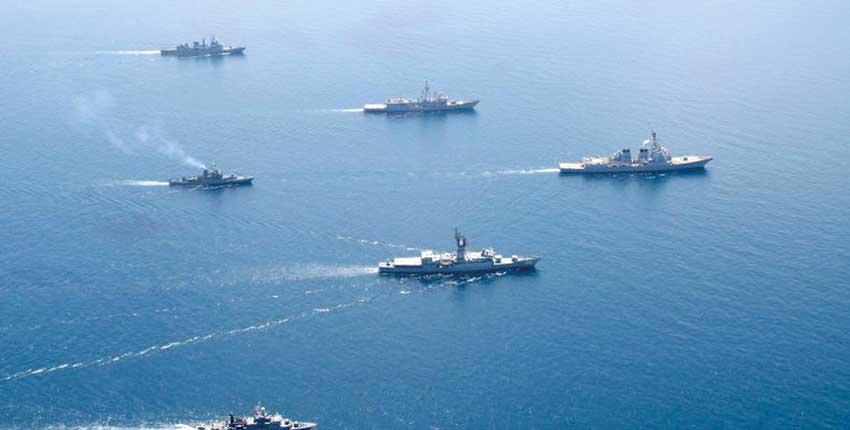Reply To:
Name - Reply Comment

 Since independence in 1948, Sri Lanka has failed to define its national interests - inevitably resulting in the void of a national defence policy to date. National interests are more than what is inscribed in the Constitution. National interests are organic in the sense, such reflects the aspirations of a state in a particular context, time and space and its foreseen immediate future.
Since independence in 1948, Sri Lanka has failed to define its national interests - inevitably resulting in the void of a national defence policy to date. National interests are more than what is inscribed in the Constitution. National interests are organic in the sense, such reflects the aspirations of a state in a particular context, time and space and its foreseen immediate future.
Despite its military triumph over the LTTE terrorists (2009), a spike of communal violence at Aluthgama (2014) and Ampara and Digana (2018) and the more recent Easter Sunday spree of suicide bombings (2019), the island nation has acutely failed to put forth an expression of intent over the security and defence of the state and its people. Amid such geopolitical paralysis, the Maritime Doctrine of Sri Lanka (MDSL) published on July 13, 2020 merits close analysis and discussion.
It is undeniable that for Sri Lanka to progress and prosper, her defence, security, development and future challenges should be viewed through the premise of a maritime nation. Hence, the need for a maritime doctrine with a holistic approach is a prerequisite
More recently, there had been attempts at articulating a National Defence Strategy - one led by the former Commandant of the Defence and Staff College Major General Udaya Perera in 2015 and by the former Chief of Defence Staff (CDS) Admiral Ravindra Wijegunaratne in 2018. All these attempts despite the initial vigour have failed desperately to realise, due to conflicting interests and organisational politics. Overall, the clear lack of a political will could be attributed to the failure.
Among all these pushes and abrupt halts towards a national security policy, the publication of the MDSL is indeed a commendable effort and a timely endeavour in the right direction. Most would think so comforting themselves against any effort at understanding the underlying intricacies.
In contrary to the wider belief, it is suggested that the 239 page, 12 chaptered document falls short of any defence-security-policy document or doctrine, mainly due to its inherent fundamental and technical weaknesses.
It is believed that the country and the Navy, in particular, need a conscious and a consultative dialogue in charting pragmatic aspirations towards achieving credibility as a force to reckon in its domain and the region.
More rightly the MDSL is a collection of defence and security fundamentals widely used as teaching materials at the Sri Lanka Military staff college. Despite, it’s a self-fulfilling confession to sway in believing the document as a product of wider consultation of experts, little does this stand ground as the MDSL is a perfect replica of the Australian Maritime Doctrine (2010) and the Indian Maritime Doctrine (2009) combined (chapter to chapter). One wonders how this would serve our national maritime aspirations.
The critique is provided with no intention of belittling the efforts but as an eye-opener in thinking through and thinking ahead in the seminal process and procedures of preparing such documents for national consumption. The timing of its publication and the hurried nature, suggests that the document served a different purpose than what it claims to represent in the front cover. In a single note, we Sri Lankans are finding innovative and inefficient ways of exhausting our limited resources.
MDSL miserably fails to chart a new way of thought or philosophy essential to a maritime nation and fiddles around its usual bandwagon surrounding the LTTE and borrowed notions
The purpose of a doctrine is to present our way of thinking, visualisation of the deployment and employment of our Naval, Coastguard and all maritime assets including the merchant marine at our disposal in gaining wider acceptance and approval locally, regionally and globally. In this sense, the MDSL miserably fails to chart a new way of thought or philosophy essential to a maritime nation and fiddles around its usual bandwagon surrounding the LTTE and borrowed notions.
Another major flaw in the document is that it fails to present itself as a statement of the nation’s intent towards its maritime-related aspirations. Doctrine is built on three fundamental blocks-ends, means and ways. Instead, the entirety of the document runs along a thread of military fundamentals that need to be taught at the academy or at staff colleges in contrast to the very purpose a maritime doctrine should serve - towards a wider community. This is a result of blatantly replicating the Australian and Indian doctrines.
Numerically and logically aspirations of over 1.3 billion Indians, with a coastline of over 7500 kilometres, a Navy of over 180 platforms and over 200 aircraft is hard to contemplate to a population of 21 million, with a coastline of a bit over 1300 kilometres and less than a dozen big ships.
Adding to its string of inconsistent constructs, the document as a strategic read lacks any reference to origins of the national security objectives as mentioned in page 11. Thus, the reader is left wondering that the eight objectives written to be imaginative or hypothetical inferences in the clear absence of any grand strategic declaration by the polity.
Ironically, the MDSL has also failed in taking into account the maritime fraternity as it proclaims to do so. The industries and stakeholders involved have been neglected through oversight or due to inherent inabilities to perceive the realities of a complex environment. Without engaging and involving the multiplicity of stakeholders in a volatile, uncertain, complex and ambiguous (VUCA) world it is just wishful thinking of the document to be accepted by anyone concerned.
There is nothing new, nothing unique that justifies or rationalises Sri Lanka’s pursuit of her national interests in her maritime environment/domain. The document also falls short of how the Navy or the nation envisions in redressing its persisting maritime challenges of poaching, illicit drug trade and policing the waters while securing its domain in maintaining good order at sea.
Further, the doctrine should have been based on a premise, such as that the government defence spending would sustain at 2% of the GDP over the next decade, without which the entire MDSL becomes a futile discourse.
Meanwhile, it is no exaggeration that the doctrine is utterly disconnected in reading our unique vulnerability due to the lack of defence in depth inherited in its geographical extent and its proximity to the Indian mainland.
In this sense, the MDSL even fails more due to its too optimistic tone. Consideration should have also to be given into the economic and financial realities that persist to dwarf any assertive ambitions in our maritime domain. A doctrine built on wishful thinking is sure to be swept away by the first wave that hits.
It is undeniable that for Sri Lanka to progress and prosper, her defence, security, development and future challenges should be viewed through the premise of a maritime nation. Hence, the need for a maritime doctrine with a holistic approach is a prerequisite. But the very existence of a maritime doctrine should be based on derivatives from a national defence policy paper and not as an abstract creation in isolation. Further, it is time that our mental blocks to be dissolved and be tuned to the global realities surrounding the defence and security environments and how power and politics had changed in the last 100 years.
In the Asia Power Index declared by the Lowry Institute in 2019 based on 25 countries in the region, Sri Lanka ranked 21st out-off 25 countries considered in the study (https://power.lowyinstitute.org/). The attempt by the Lowry Institute was to quantify the power of a state, which defined national power as the capacity of a state or territory to direct or influence the behaviour of other states, non-state actors, and the course of international events. At its simplest, it is the capacity to impose costs and confer benefits that shape the choices of others.
The study had used 126 indicators across 8 thematic measures of power: Military capability, resilience, diplomatic influence, economic relationships, defence networks, cultural influence and future resources, which would have been worthy reference if considered and amply gives evidence that the very construct of the MDSL is disconnected with the realities of the country.
Yet, it is believed that the country and the Navy, in particular, need a conscious and a consultative dialogue in charting pragmatic aspirations towards achieving credibility as a force to reckon in its domain and the region.
A policy paper, doctrine or strategy – come what may, should be ultimately rooted in the realities of the existing context, time and space and be treated as organic, ensuring its pragmatic evolution in meeting a nation’s or an organisation’s existential issues.